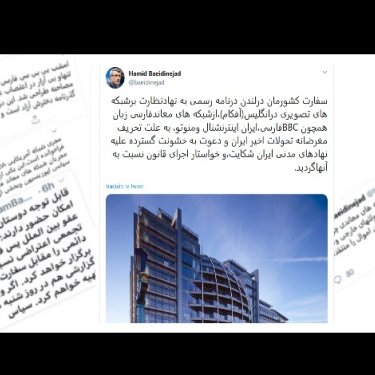Iranian ambassador threatens UK-based Iranian journalists and media

Reporters Without Borders (RSF) condemns Iranian intelligence agency harassment and threats against Iranian journalists based abroad, especially in Britain, and against their families still in Iran, and the role played by the Iranian ambassador in London in relaying these threats.
The threats are targeting Iranian journalists working for international media such as the BBC, Voice of America, and Radio Farda (Radio Free Europe) and privately-owned Iranian exile media such as the Iran International and Manoto TV channels and the Kayhan London news website. At the same time, their relatives in Iran are being summoned and threatened by members of the Revolutionary Guard intelligence services.
According to the information gathered by RSF, the threats against Iranian journalists based abroad often take the form of online attacks, insults and intimidation, mainly on social networks.
Ever since Hamid Baeidinejad, the Iranian foreign ministry’s former director of political affairs and international security, took over as the Islamic Republic’s ambassador in London, he has been threatening these media and journalists on Twitter.
Protected by his diplomatic immunity, the ambassador repeats the accusations of the Iranian intelligence services and uses the same rhetoric as they do, accusing journalists of being the “agents and mercenaries of foreign services, paid by the country’s enemies and acting against the national interest.”
He even posted a video on Twitter that showed a BBC reporter covering a demonstration by Iranians outside the Iranian embassy in London and said the reporter was talking to a terrorist group. The videos and their accusations are always in Persian, never in English.
Two days after the Internet was completely disconnected in Iran in order to restrict the flow of information about the regime’s crackdown on a wave of protests, the ambassador reiterated his threats against Iranian journalists based abroad in an angry, accusatory tweet.
It said: “The Iranian people will never forget these days in which enemy TV channels such as the BBC, VOA, Manoto and Iran International – subsidized by the money of foreign governments and the Pahlavi group – have put Iran in danger by trying to portray the rioters, who are murderers and arsonists, as political dissidents.” Pahlavi is the name of the former shah of Iran’s family.
The same day that this tweet was posted, the parents of several journalists based abroad were summoned and threatened by intelligence ministry agents who, in essence, told them: “Tell your children to stop working for enemy TV channels. It will be better for them and for you.”
Iranian journalists have for years been receiving long jail sentences on charges of “collaborating with enemy media” and spying. RSF is aware of at least 25 cases of families of journalists being summoned and threatened, usually by intelligence ministry agents, since the start of the year.
Most of these journalists prefer not to be named for fear of provoking more harassment. Very few dare to refer openly to such harassment, as Farnaz Ghazizadeh, a BBC journalist, did in this tweet on 23 November: “My 73-year-old father has been summoned and questioned by Iranian authorities in relation with my sister and myself working for the media outside Iran. Our families are under pressure just because we are journalists.”
The Iranian ambassador in London meanwhile announced in a tweet on 22 November that his embassy has filed a complaint with the Office of Communications (Ofcom), the UK’s broadcast media regulator, accusing the BBC, Manoto and Iran International of “distorted coverage of events in Iran and inciting massive violence against state institutions.”
“Threatening citizens, in particular, a country’s journalists and media outlets, are not part of an ambassador’s attributions,” RSF said. “The British authorities should monitor these activities, which pose a threat to press freedom and a danger to journalists.”
Iran is ranked 170th out of 180 countries in RSF’s 2019 World Press Freedom Index.



